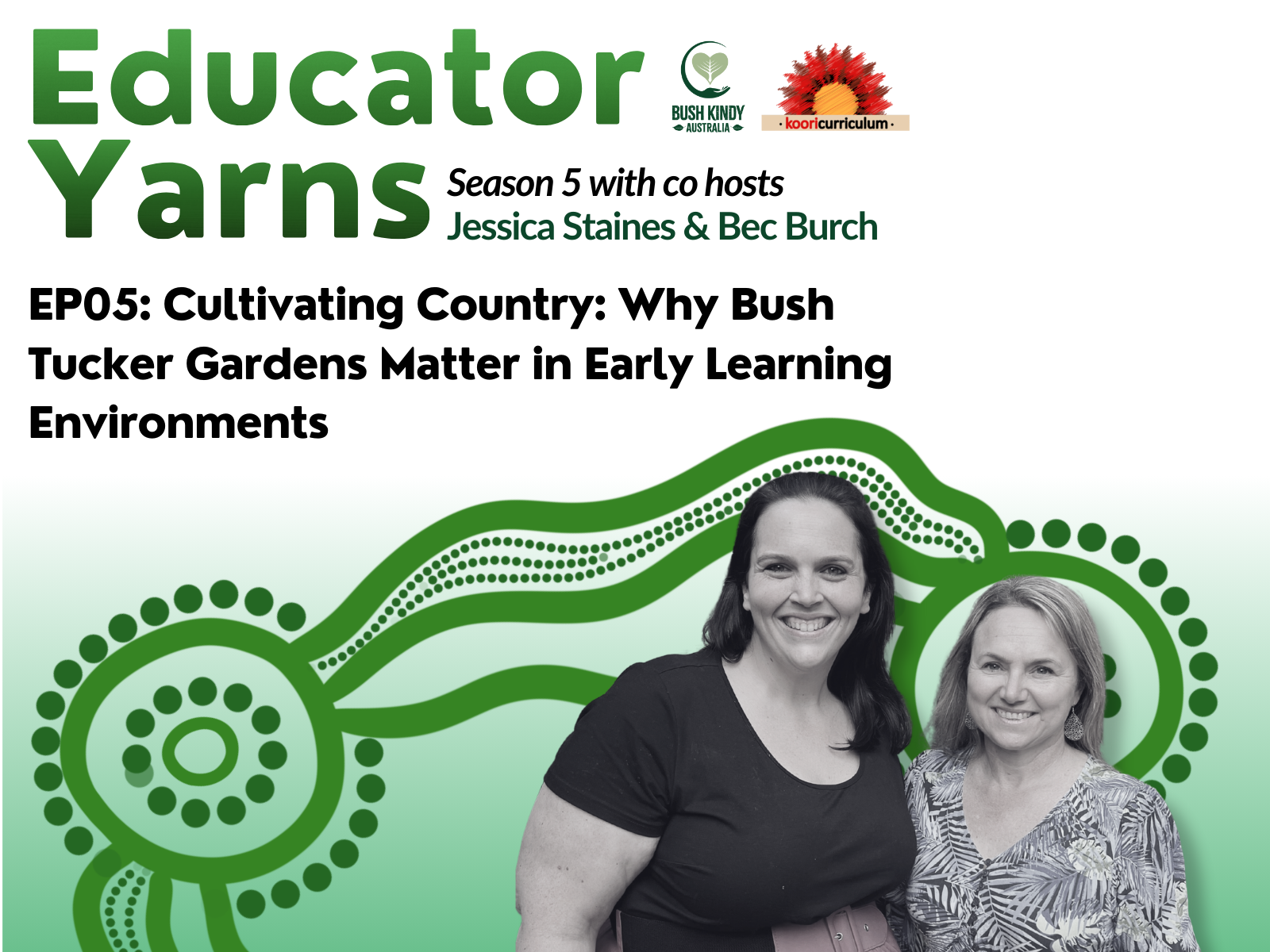In this illuminating episode of Educator Yarns, we welcome back Bec from Bush Kindy’s Australia for an in-depth conversation about Bush Tucker Gardens in early learning environments. Together, Jessica & Bec explore the profound educational value these spaces offer and address a common challenge observed across many services: the tendency for Bush Tucker plants to be underutilised, neglected, or misunderstood.
Bec shares her wealth of knowledge about why these gardens matter, how they connect children to Country, and practical approaches to establishing and maintaining meaningful native plant spaces that authentically reflect local ecosystems.
Drawing from their extensive experience working on Country and witnessing successful implementations in educational settings, they offer invaluable insights for educators wanting to move beyond tokenistic inclusion of native plants towards genuine engagement with Aboriginal perspectives through place-based learning experiences.
Key Takeaways:
- Bush Tucker Gardens create meaningful connections to place-based pedagogy, allowing children and educators to learn about their local community, ecosystems, and Indigenous knowledge systems.
- Native plant spaces in early learning environments establish essential green corridors for wildlife, particularly important in urban areas or regions affected by environmental events like fires or cyclones.
- Rather than creating isolated "Bush Tucker sections," consider integrating native plants throughout your entire outdoor learning environment for a more inclusive and authentic approach.
- Research what's endemic to your specific area by connecting with local nurseries, community organisations, Elders, or using apps like iNaturalist to identify local species.
- Involve children in the entire process - from researching local plants, mapping garden spaces, tracking sunlight patterns, identifying ideal locations, and creating signage for plants.
- Start small with quality over quantity – seven mature plants are more valuable than numerous seedlings, especially as many native species grow slowly.
- Consider practical factors when planning: sun exposure, accessibility, traffic patterns, and which age groups will interact with the plants.
- Native plants often require less maintenance than introduced species – sometimes "neglect" is better than over care, as they're adapted to local conditions.
- Establish rhythms and routines for observing and engaging with the plants through regular visits that involve sensory exploration and documentation of seasonal changes.
- Dead or neglected Bush Tucker Gardens send problematic messages to both children and community members about valuing Indigenous knowledge and perspectives.
Bush Tucker Gardens represent a powerful opportunity to move beyond tokenistic approaches to embedding Aboriginal perspectives by creating authentic connections to Country right within your learning environment. By thoughtfully planning, researching local ecosystems, involving children meaningfully, and embracing the natural rhythms of native plants, educators can create spaces that honour First Nations knowledge while fostering deep environmental stewardship in young learners.
We encourage you to start your Bush Tucker journey today—whether beginning with a small collection of mature plants or revitalising an existing garden—and witness how these living educational resources transform both your physical space and pedagogical practice.
Resources discussed in this episode:
- Koori Curriculum & Bush Kindy Australia Events
- Koori Curriculum Professional Development
- Bush Kindy Australia Professional Development
- iNaturalist App
- Google Lens
- Native Wildflower Nursery
- Sustainable Natives
- The Rainforest Nursery
- Landcare Groups
- Urban Discovery
- Creating a Bird Friendly Garden
- The Koori Curriculum Leadership Retreat
Connect with Jessica Staines:
- Koori Curriculum
- Koori Curriculum Educator Community
- Shirley Pearl & Her Bush Friends
- The Koori Curriculum Club
- Koori Curriculum Events
Connect with Bec Burch:
Subscribe to Educator Yarns on your favourite podcast platform:




